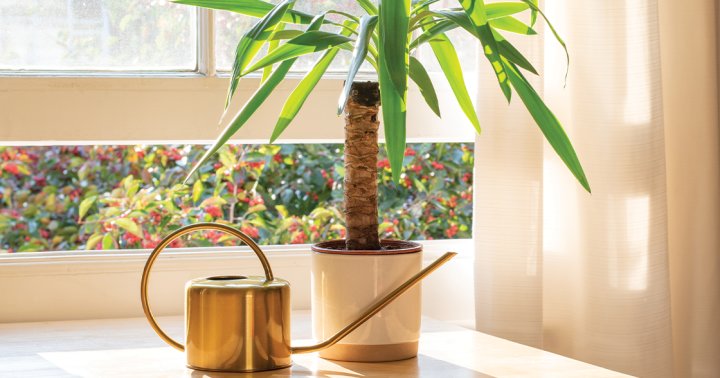Reimagining Your Mid-life Journey
There are many misconceptions about the changes women go through in middle age. Mindfulness teacher Cara Bradly offers a deep dive into mindset, menopause, and positive change. The post Reimagining Your Mid-life Journey appeared first on Mindful.

This article is independently written and researched by the author, and created in support of a paid partnership between Mindful and Winona.
Most of us carry limiting beliefs in our heads about midlife and menopause that have simply been passed down and that often aren’t even true. Beliefs like:
I’m too old. Nothing works for me. My best days are behind me. I just have to live with (fill in the blank). I’ll never feel better.When we’re really going through it, it can be easy to slip into a personal cave of limiting beliefs that can conspire to keep us there in the cold and dark.
But where do these beliefs come from? Are they even true? What would we do if we didn’t have them?
Consider the possibility that 90% of our limiting beliefs are subconscious. They’re attitudes we’ve accumulated from just being in the world.
Education helps us to shed the burden of these old limiting beliefs and create a new mindset, so we can move forward and live with excitement and hope.
Let’s explore the powerful intersection of mindset and menopause, and the transformative shifts essential for leaning into this pivotal time of transition.
What is a Mindset?
Carole Dweck, a renowned psychologist, introduced the concept of mindsets as a way to understand how our beliefs about our abilities and traits shape our behavior and outcomes.
According to Dweck’s research, there are two primary types of mindsets: fixed and growth.
Living with Fixed Menopause Mindsets
A “fixed mindset” is like thinking your abilities, smarts, and personality are set in stone and can’t be changed. People with this mindset usually steer clear of tough stuff and give up quickly. They often think trying hard is pointless and don’t listen to feedback. Here are examples of how a fixed mindset may apply to menopause.
5 Fixed Menopause Mindsets
1. The Menopause Curse: Thinking that menopause is like some dark spell that only brings misery and that there’s absolutely nothing good about it.
2. Accepting the Decline: Believing that when menopause hits, you’re pretty much doomed to feel worse physically and mentally, and there’s no way around it.
3. Resistance to Change: Stubbornly refusing to make any changes to your lifestyle to deal with menopause symptoms, and believing that feeling worse is just a regular part of getting older.
4. Give Me the Meds: Putting all your faith in pharmaceutical interventions to handle menopause symptoms and not even considering other options like lifestyle shifts or natural supplements.
5. The Stigma: Seeing menopause as some kind of taboo topic, never talking about it openly, and feeling awkward or ashamed about seeking help or information for this totally natural phase of life.
Thriving with Growth Menopause Mindsets
Now, a “growth mindset” is more like believing your abilities and smarts can change and expand if you put in the effort. Folks with a growth mindset welcome challenges, keep going even when it’s tough, see effort as a way to get better, and learn from feedback and advice. Here are examples of how a growth mindset may apply to menopause.
5 Growth Menopause Mindsets
Embracing Change: Seeing menopause as a natural part of life’s journey and embracing it as an opportunity for personal growth and transformation. Knowledge is Power: Actively digging into info about menopause, what you can expect, how to handle it, and being open to trying out different things. Lifestyle Tweaks: Being up for making positive changes, like getting into healthier eating habits, starting a workout routine, or giving meditation a shot to boost both your body and mind during menopause. Lean on Your Team: Believing in the power of support from friends, family, or fellow menopausal warriors, and not being shy about sharing experiences, advice, and a good laugh or two. Embracing the Suck: Looking at menopause-related challenges as opportunities to grow and become more resilient, knowing that even when things get tough, you’re gaining wisdom and a deeper understanding of yourself.Changing from Fixed to Growth
Changing your mindset from fixed to growth is a process that requires self-awareness and agency.
1. Self-awareness: Begin by recognizing your fixed beliefs. Pay attention to when you avoid challenges. Acknowledge these moments without judgment.
2. Challenge Fixed Beliefs: Actively challenge these fixed beliefs. When you catch yourself thinking, “I can’t do this,” reframe it as, “I can’t do this yet.” This small shift in language can make a world of difference.
3. Play at the Edges: Seek out challenges that push you out of your comfort zone. Embracing challenges and getting into action is a powerful way to develop a growth mindset.
4. Learn from Setbacks: Instead of seeing failures as dead ends, view them as opportunities for growth and learning. Analyze what went wrong and how you can improve next time.
5. Cultivate Persistence: Developing a growth mindset requires consistency and persistence. Keep practicing and remind yourself that growth takes time.
Mindset Matters
Menopause is not a decline but an opportunity for growth and transformation. Yes, menopause can present challenges, and there are certainly circumstances that require medical intervention. But shifting our experience of this change begins with our mindset. By understanding the difference between fixed and growth mindsets and actively working to shift our beliefs, we’re much more likely to be able to navigate this life stage with strength, resilience, and a sense of celebration.

 KickT
KickT 
































